Update: New Resources Added!!
Update: New resources added!!
Over the past 2 days I've added new resources to my resources page! They're instagram/social media tutors but I've complied a mini list here. Some I like more than others, but I would recommend all of them to supplement your studies! Full reviews are on the page~
I also updated a few ratings and pricing for some of the resources as well, which I've made note of in the descriptions on the page.
Here are the new ones I added!
Zita Wong Chinese - insta, adorable and kind and progressive, great functional and colloquial vocab, real-life conversations and interviews with native and nonnative speakers in China
Leila Laoshi - non-native speaker who has translated chinese professionally, great vocab, fascinating lifestyle living in bali
Chilling Chinese - awesome podcasts, actually affordable membership
Sabine Hui Chinese - funny, functional & colloquial vocab
Learn Chinese with Jian - pronunciation guides & functional vocab
More Posts from Lia-kotik-blog and Others
Pronunciation Advice for Language Learners: How to Figure Out What You're Doing Wrong
The other day, my friend @calystarose was struggling with the phrase 出去吃 chūqùchī (go out to eat). This is a tongue twister for a lot of native English speakers. Even if we manage to get the individual vowels and consonant sounds correct, we often have a hard time stringing the words together.
I thought about the problem for a bit and then I told her to try saying it with her teeth clenched:
Why would that help?
Clenching your teeth forces you to hold your jaw still, and limits the amount of space your tongue has to move around. You can still make roughly the same sounds you were making before, but the new limitation forces you to make those sounds with smaller muscle movements.
Smaller movements reduce the amount of time and effort it takes to get from one syllable to the next.
.
Talking fast is more about efficiency than speed.
.

ɪᴘᴀ ᴋᴇʏʙᴏᴀʀᴅ ʀᴇꜰᴇʀᴇɴᴄᴇ ᴄʜᴀʀᴛ ᴍsᴋʟᴄ_ɪᴘᴀɢʀᴀᴘʜɪᴄ.ᴘᴅꜰ [sᴏᴜʀᴄᴇ]
When I first started taking French lessons, I had an easy time pronouncing words like "grand" and "robe." But then I ran into the word "livre," and suddenly I was getting tongue tied.
I realized my r was too far back in my throat. Too guttural.
This worked for a word like "grand" where the r is next to a g, a gutteral consonant. A consonant like v, on the other hand, is right at the front of the mouth, on the teeth.
If I wanted to say "livre" smoothly, I'd have to push my r further forward in my mouth, closer to that letter.
.
There's almost always more than one way to make your mouth form a particular vowel or consonant sound.
.
I noticed a while back that I say these letters t & d differently depending on whether I'm trying to speak English or Mandarin.
My t's and d's are little firmer in Mandarin than they are in English — my tongue is held stiffer, and the tip is more pointed when it comes into contact with my hard palate.
The funny thing is, I can't really hear a difference.
But I can feel the difference in my mouth when I shape the letters.
I never made a conscious decision to change how I say these consonants when speaking Mandarin — this is just something I naturally started doing when mimicking the recorded dialogue in my Duolingo audio lessons.
I realized it wasn't about getting the consonants to sound correct.
It was about what came after those consonants. The vowel sounds:
Chinese vowels are really different from English vowels. By changing how I shaped these consonants, I was setting up my mouth for a smoother transition into the next vowel sound.
.
Proper enunciation isn't just about making the right sounds come out of your mouth. It's also about transitioning from one sound to the next as fluidly as possible.
Crafting a language self-learning curriculum (sort of)
In my experience textbooks aren’t really the best way to learn after you’ve passed a certain level. They’re incredibly useful for beginners to learn grammar and vocab but after that they don’t offer a lot of activities that help you implement your learning in a way that reflects how you will actually use it.
It’s also near impossible to learn a language without help. Don’t isolate yourself just because you are self-learning rather than taking lessons. You NEED to talk to native speakers, both through text messages and actual verbal conversations. Colloquial conversations will differ greatly to formal an ‘correct’ ones spoken in a classroom.
1. The first step I suggest when creating a curriculum is to know what your goal is. Are you planning to move to the country the language is spoken in? Do you want to study as a way to better understand and appreciate the culture?
2. The next would be to gauge what level you are at through taking a language competency test. This is mostly so you have an idea of what you do know and what is considered the universal “next step” to give yourself a general direction to head towards.
3. Write down topics that interest you. For me these would be my career (marketing and digital media), my interests (video games, ttrpgs, fashion, history, horror novels), and important parts of my identity (my religion, my sexuality, my partner, my disability) etc. I didn’t bother writing down anything I already know such as how to talk about my family, how to talk about my country of birth, or hobbies commonly written in textbooks such as reading, swimming, camping.
4. Now come up with a list of general activities to cover your listening, writing, reading and speaking skills. Some examples are listed below:
Listening:
Watch 5 minutes of the news - recaps or weekly rundowns are great for this
Listen to an audio book for half an hour whilst cooking, cleaning, commuting etc.
Create playlists of music you actually like in your target language - you can further this by watching interviews about the artists or watching any live performances/streams they have done.
Writing:
Write 1-2 paragraphs about a chosen topic without any dictionary or vocab list aid, any words you cannot remember or do not know just write in your native language. Return with a dictionary to fill in these missing words after and ask a native speaker to make any corrections they can spot and finally rewrite everything with all the corrections (taken from Lindie Botes).
Write practice professional emails, blog-posts, product reviews, leave comments under Instagram posts etc. Make sure to learn how to write in different situations: how does writing an email to your boss differ from writing to your colleague? How are businesses addressed on review sites? What changes when writing a blog for fashion from one about politics? Learn these nuances.
Text your native speaker friends - simple but necessary
Reading:
Read and summarise a key news article from this week
Read a page from a book in your target language, highlight any unknown words to return to. Write out the sentences these words occurred in then the words on their own with their definition and create a new sentence using them. My key tip for this is not to be too ambitious with what you are reading. Don’t try to read an epic fantasy, instead focus on short stories and books for children aged around 5-10. As you improve you can read more complicated plots but just because you are familiar with the book in your native language does not mean you will understand what is going on.
Speaking
Record yourself leaving fake voice mails. This can be for a doctor’s appointment, inquiring about a job, asking to hangout with a friend etc. Keep it short and tone appropriate. This also gives you the opportunity to research phone etiquette in that culture.
Talk. To. Native. Speakers.
5. Combine your topics of interest with activities to give you something that should resemble almost a lesson plan.
Example:

Chinese websites 🇨🇳[MASTERPOST]

Last time when I posted the list with my fav websites where you can practice reading in Chinese, so many of you liked it and shared it! I appreciate it so much… and decided to make something extra, add more websites I found useful during Chinese learning process.
~~~~~~~~~~~~~~~~ ♡ ~~~~~~~~~~~~~~~~
Reading in Chinese
♡ Mandarin Bean (news in Chinese, HSK 1-6)
♡ Chinese Reading Practice (stories, essays, legends, chengyu stories)
♡ The Chairman’s Bao (news in Chinese, HSK 1-6)
♡ HSK Reading (and more articles!)
♡ My Chinese Reading (stories, scientific, business/politics, history etc)
♡ BBC News in Chinese (for more advanced learners)
♡ + Baidu Baike (something like Chinese wikipedia)
Grammar and HSK websites
♡ Chinese Grammar Wiki (saved my as… I mean my life MANY times)
♡ HSK Online (perfect place to test yourself, learn new words and gain a lot of knowledge how HSK looks like)
Online courses
♡ Courses on edX
♡ Courses on Coursera (recommend these courses created by Peking University)
Online Dictionaries
♡ MDBG ♡ Yellow Bridge
♡ Pleco (APP) ♡ Bohan (for 🇵🇱 ppl)
YouTubers
Teachers:
♡ ShuoShuo Chinese
♡ Mandarin Corner
♡ Chinese Zero To Hero
♡ Everyday Chinese
♡ Learning Chinese through Stories
♡ Daily Zhongwen
♡ HSK Test Preparation and Practice
♡ SyS Mandarin
Chinese vloggers
♡ Elena Lin
♡ Nuria Ma
♡ Liziqi
♡ WenWei
Foreigners in/about China
♡ Blondie in China
♡ Weronika Truszczyńska (Polish vlogger, her shoots are incredible; there are English subs)
♡ Ychina
Online Bookstores
♡ Purple Culture
♡ Sinolingua
♡ ChinaBooks
♡ Mandarin Companion
Where you can watch Chinese drama/movies/cartoons?
♡ YouTube (try to type the Chinese title, high possibilities it will show up! fe. THEY have quite a lot of dramas ;>
♡ iQIYi
♡ Netflix -> Taiwan on Netflix + Movies from Mainland China on Netflix
♡ Little Fox Chinese
~~~~~~~~~~~~~~~~ ♡ ~~~~~~~~~~~~~~~~
♡ If you liked this post please like, share! ♡
You can also: ♡ follow me on Instagram
♡ and subscribe my YouTube channel
Linguistics Terms in Chinese
*Common terms found in textbooks, on tests, etc. that no one has ever taught me explicitly; will update periodically through reblogs-please share if you know other ones!! We can use these words to talk about our study, ask for help, or better understand test questions and practice sets.

语法 -grammar
生词 - vocabulary
口语 -speaking
写字 -writing
阅读 -reading
跨文化交际 - cross-cultural communication
汉字 - characters
拼音 - pinyin
偏胖 - character radicals (e.g. 口袋的口)
名词 -noun
动词 -verb
副词 - adverb
状语 -adverb phrase
量词 -measure word
连词 -conjunction
句子 -sentence
主语 - subject of a sentence
分句 - sentence clause
注释 -explanatory notes
不同点 -differences
对话 - dialogue
专有名词 -Proper nouns
词义 -meaning of a word, definition
形合 -a linguistics term that literally means “shape focused;” it refers to the way that languages like English focus more heavily on structures like grammar to be intelligible; in contrast to the below term, 意合
意合 -a linguistics term that literally means “meaning focused;” it refers to languages like Chinese that focus more heavily on meaning, so they can rely on repetition of certain words or phrases within a sentence or utterance without sounding redundant; in contrast to the above term, 形合
练习 - practice
复习-review
预习 - preview
考试 -test
做作业 - do homework
例如 - example
判断对错。 - judge true or false.
题 - question (usually 第 + # + 题)
请选出真确回答。 - choose the correct answer.
选词填空。-fill in the blanks.
排列顺序。- arrange / put in order of sequence.
部分 -part (usually 第 + # + 部分)
完成句子 - finish the sentences.




沉鱼落雁,闭月羞花
Literal Translation: to make fish sink and wild geese drop, to outshine the moon and shame the flowers
Individual Characters:
沉 (chén) : to sink
鱼 (yú) : fish
落 (luò) : to fall/descend (降落)
雁 (yàn) : wild goose (大雁)
闭 (bì) : to shut/close; to obstruct (note: this word appears in lots of two-character words having to do with shutting/closing, but I can't find a word it's in that means "outshine" like it does in this phrase, unless one of you knows of one, it's most likely a purely metaphorical meaning)
月 (yuè) : moon
羞 (xiū) : to shame
花 (huā) : flower
Story:
This one has to do with the Four Beauties (四大美人) of China. If you don't know their stories, I'd recommend looking into them; I'm not going to rehash them here because I don't know them very well myself, but I'll give a brief summary (keep in mind these will be very surface level and there's much much more to the stories)
西施 (xī shī) lived during 春秋, the Spring and Autumn Period (770-476 BCE) and is the first of the 四大美人。 She went to the river one day to wash clothes, and, seeing her through the water, the fish were so stunned by her beauty that they forgot to swim and sank to the bottom of the river. Her story makes up the 沉鱼 portion of this 成语。
王昭君 (wáng zhāo jūn) lived during 西汉, the Western Han Dynasty (206 BCE-25 CE). During this time period, the Xiongnu and the Han kept having border skirmishes, so the emperor decided to send 王昭君 to marry the leader of the Xiongnu. On her way, she played her lute. The geese heard the music and looked down, forgetting to fly after seeing her beauty. Her story makes up the 落雁 portion.
貂蝉 (diāo chán) lived during 东汉, the Eastern Han Dynasty (25 - 220 CE). It's said that when she went out at night, clouds would immediately cover the moon. Because of this, it was said that she outshone the moon. Her story makes up the 闭月 portion.
杨玉环(yáng yù 杨宇huanhuán) lived during 唐朝, the Tang Dynasty (618 - 907 CE). She was selected to be a concubine because of her beauty, but she missed home. One day, while walking in the palace gardens, she touched a flower. It folded in on itself, and, a palace maid having seen, the legend that 杨玉环 shamed the flowers with her beauty was born. Her story makes up the 羞花 portion.
Figurative Meaning:
沉鱼落雁:to be incredibly beautiful/captivating
闭月羞花:to be unnaturally/exceedingly beautiful
沉鱼落雁 and 闭月羞花 can be used together or separately
Resources/Further Reading:
Road to Learning Chinese Podcast (A)
Road to Learning Chinese Podcast (B)
Chinese Tuition Singapore (all Chinese story)
Yang Chen Live Journal
Confucius Classroom (video for learners)
老梁 (video completely in chinese and designed for natives i think?)





上海外灘 Shanghai bund
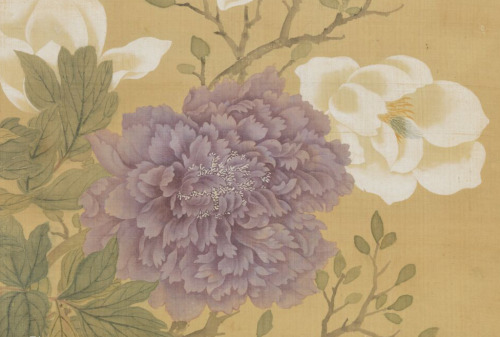
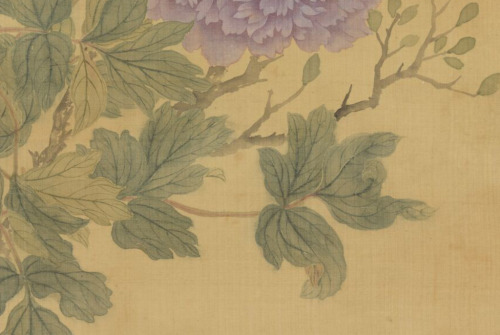

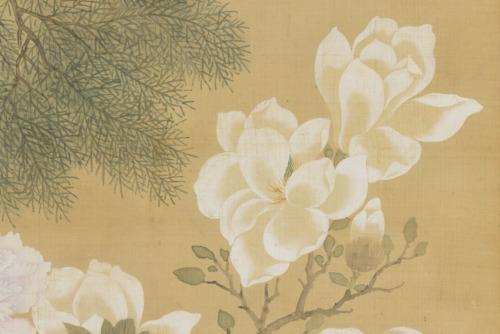
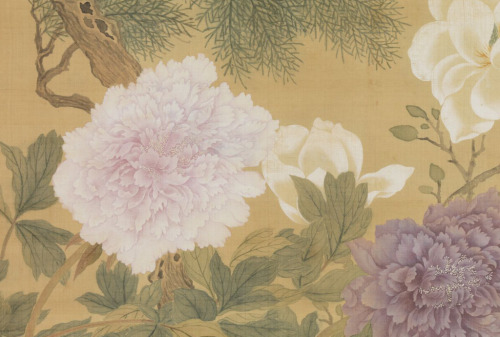
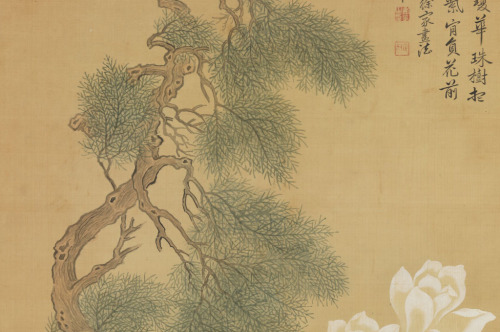
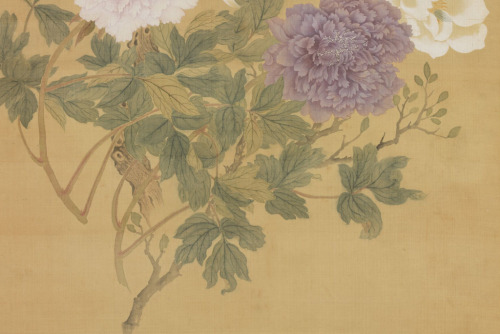
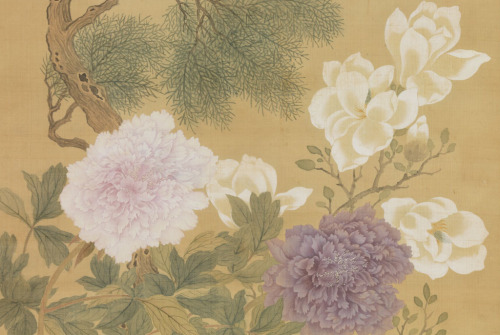

chinese artist 恽寿平 yun shouping (1633-1690)
A man in Inner Mongolia, China, comparing the sizes of goats at different ages.
English added by me :)




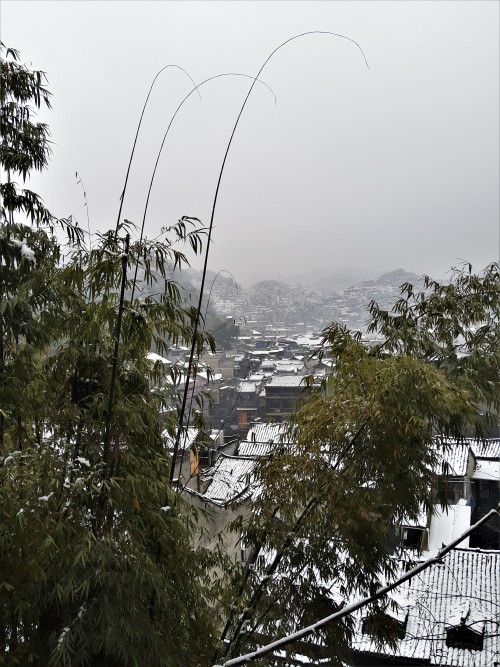

Winter in Fenghuang, Hunan
-
 shin-moonkil liked this · 3 months ago
shin-moonkil liked this · 3 months ago -
 languagegremlin reblogged this · 9 months ago
languagegremlin reblogged this · 9 months ago -
 highschoolmusical-4 liked this · 1 year ago
highschoolmusical-4 liked this · 1 year ago -
 langblr-17 reblogged this · 1 year ago
langblr-17 reblogged this · 1 year ago -
 vinguist liked this · 1 year ago
vinguist liked this · 1 year ago -
 mxriakdkd liked this · 1 year ago
mxriakdkd liked this · 1 year ago -
 memphisz reblogged this · 1 year ago
memphisz reblogged this · 1 year ago -
 513rhein liked this · 1 year ago
513rhein liked this · 1 year ago -
 greentea-honey-lemon liked this · 1 year ago
greentea-honey-lemon liked this · 1 year ago -
 mauglobsimpra liked this · 1 year ago
mauglobsimpra liked this · 1 year ago -
 pungingrasphi liked this · 1 year ago
pungingrasphi liked this · 1 year ago -
 studyingnstruggling reblogged this · 1 year ago
studyingnstruggling reblogged this · 1 year ago -
 indianabonez liked this · 1 year ago
indianabonez liked this · 1 year ago -
 nonstopfandomposts liked this · 1 year ago
nonstopfandomposts liked this · 1 year ago -
 sourpatches111 liked this · 2 years ago
sourpatches111 liked this · 2 years ago -
 tinyfairlight liked this · 2 years ago
tinyfairlight liked this · 2 years ago -
 spinning-angel liked this · 2 years ago
spinning-angel liked this · 2 years ago -
 headlights-at-night reblogged this · 2 years ago
headlights-at-night reblogged this · 2 years ago -
 tumbleweedhatsfit liked this · 2 years ago
tumbleweedhatsfit liked this · 2 years ago -
 moonga-zer liked this · 2 years ago
moonga-zer liked this · 2 years ago -
 grokemaiden liked this · 2 years ago
grokemaiden liked this · 2 years ago -
 i-declare-the-poland-rule liked this · 2 years ago
i-declare-the-poland-rule liked this · 2 years ago -
 buratinoise liked this · 2 years ago
buratinoise liked this · 2 years ago -
 asilverstarn liked this · 2 years ago
asilverstarn liked this · 2 years ago -
 tiny-tired-and-sad liked this · 2 years ago
tiny-tired-and-sad liked this · 2 years ago -
 moonsetlangblr reblogged this · 2 years ago
moonsetlangblr reblogged this · 2 years ago -
 aromantic-and-aromatic liked this · 2 years ago
aromantic-and-aromatic liked this · 2 years ago -
 imcrazybutfree liked this · 2 years ago
imcrazybutfree liked this · 2 years ago -
 kirbylovr3 liked this · 2 years ago
kirbylovr3 liked this · 2 years ago -
 studyingthesky reblogged this · 2 years ago
studyingthesky reblogged this · 2 years ago -
 heyisupposesomeonealreadyusethis liked this · 2 years ago
heyisupposesomeonealreadyusethis liked this · 2 years ago -
 academic-panda reblogged this · 2 years ago
academic-panda reblogged this · 2 years ago -
 terrene-melody liked this · 2 years ago
terrene-melody liked this · 2 years ago -
 lettrangere liked this · 2 years ago
lettrangere liked this · 2 years ago